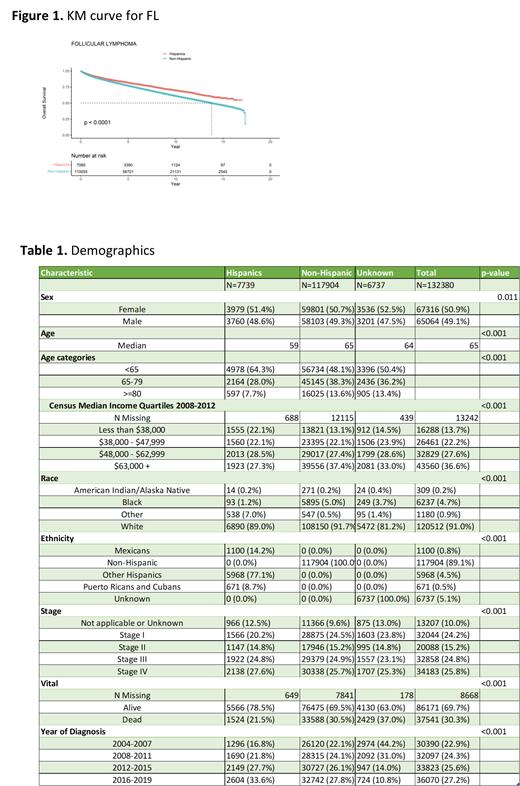BACKGROUND:
Follicular lymphoma (FL) is projected to increase its incidence to 13,619 new cases per year by 2025 in the United States (US), making it the most common indolent non-Hodgkin lymphoma (NHL) (Maedica PMID: 24790664, Leukemia & Lymphoma PMID: 34510995). Previous studies using the Surveillance, Epidemiology, and End Results (SEER) 18 database noted better progression-free survival in Hispanics (HI) compared to non-Hispanic (NH) patients. The purpose of this study was to expand upon and continue prior racial and ethnic disparity research in NHL using the National Cancer Database (NCDB) with an emphasis HI and NH patients diagnosed with FL in the US.
METHODS:
Data were analyzed on FL patients in the US reported to the NCDB between 2004 and 2019. Demographic and treatment characteristics were compared between ethnic groups, specifically HI and NH. Kaplan-Meier and Cox regression analyses were used to compare overall survival (OS) between HI and NH populations. Multivariate analysis and propensity score matching was performed with adjustment for age, stage, co-morbidity score, insurance status, type of facility, and great circle distance.
RESULTS:
Of 132,380 follicular lymphoma patients, 6% were HI, and 89% NH. HI and NH had 49% of male patients. HI patients were younger at diagnosis (median 59 years HI vs 65 years NH, p<0.001). Furthermore, the distribution of age categories had more HI patients in the <65 years category and more NH patients in the 65-79 and >=80 years categories (p<0.001). The proportion of HI patients diagnosed with FL has steadily increased since 2004, with 262 (3%) of HI patients diagnosed in 2004 to 649 (8%) diagnosed in 2019. NH patients did not vary significantly over the same period, ranging from 6290 (5%) in 2004 to 7841 (7%) in 2019. Most of HI and NH patients were white (89% vs 92%), followed by Black (1% vs 5%). More NH patients presented with stage I disease (24%) and less with stage IV disease (26%) than H patients (20% and 28% respectively, P <0.001). HI and NH had 5% ≥ 2 Charlson-Deyo Score measuring comorbidities.
The most common insurance type was government-sponsored for HI and NH (45% vs 53%), followed by private insurance (43% vs 43%). More HI patients were uninsured than NH (9% vs 2% respectively, P<0.001) Regarding Census Median Income (2008-2012), the most common income bracket for HI was $48,000 - $62,999 (28%), while the most common income bracket for NH was $63,000 (37%). 22% of HI patients had a median income of less than $38,000, as opposed to 13% of NH patients.
Academic/Research Programs, including NCI- designated comprehensive cancer centers, was the most common facility type providing care for HI (42%) and NH (31%) patients. With respect to the median distance in miles between the patient's residence and the hospital that reported the case (Great Circle Distance), HI lived at a median of 7.2 miles and NH at a median of 9.6 miles (P<0.001).
On survival analysis, the survival probability at 2, 5 and 10 years for HI vs NH were 90% vs 88%, 82% vs 77%, and 70% vs 61% respectively. The median survival time (MS) was not reached for HI vs 13.8 years for NH. OS was statistically significant favoring HI cohort. Independently, on multivariate analysis, private insurance type was associated with better OS (HR 0.73, CI 0.67-0.79, p<0.01) and non-insured status was associated with worse OS (HR 1.40, CI 1.23-1.58, p<0.01)
CONCLUSION:
This data analysis from the NCDB between 2004 and 2019 represents one of the largest study cohorts of FL patients and is consistent with prior findings of our group demonstrating better OS for the HI cohort. Furthermore, HI with FL presented at a younger median age than their NH counterparts, and there were statistically significant differences in survival probability at 2, 5, and 10 years. Since HI patients had a lower median income and less insurance coverage yet had better survival than their NH counterparts, it is possible that intrinsic biological differences in HI patients with FL lead to better outcomes, although further research is necessary.
Disclosures
Diaz Duque:Lilly: Consultancy; ADCT: Consultancy; AstraZeneca: Consultancy; Genentech: Consultancy; Morphosys: Consultancy.


This feature is available to Subscribers Only
Sign In or Create an Account Close Modal